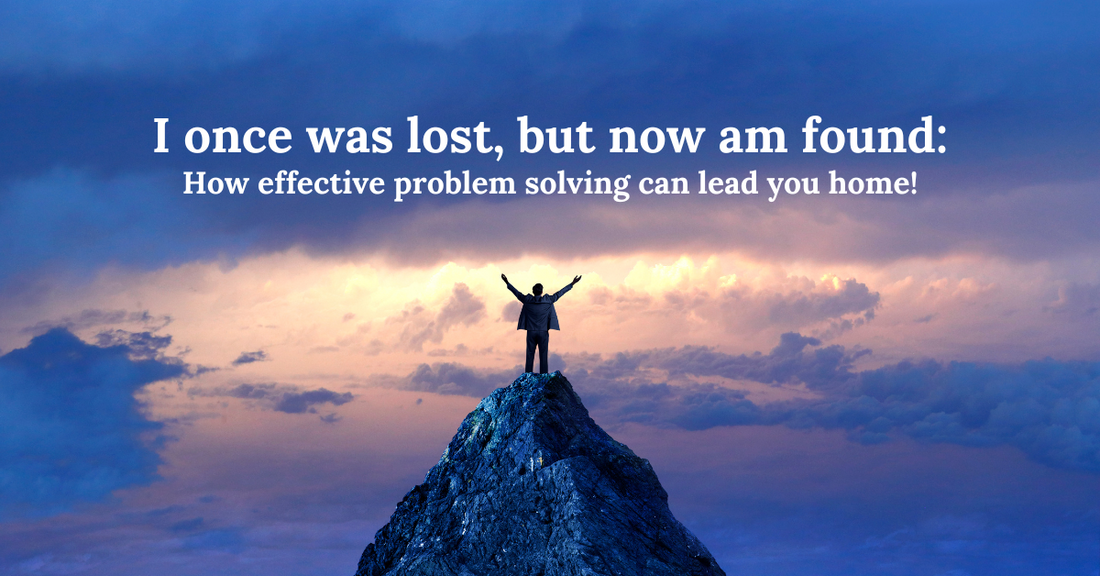When I was about 12 years old, I went on a backpacking trip in the Allegheny Mountains of Pennsylvania with my Outing Club. I was enjoying the beauty of my surroundings when nature called, and I strayed too far from camp. I soon found myself totally turned around and lost in the vast forest of the mountains! That feeling of not knowing which way to turn and no help in sight has stayed with me all these years. I often wonder if my patients with diabetes feel that way. A sense of being lost within the mountain of decisions and many times not knowing how to get back on the right path. The good news is that within a few hours I was happily reunited with my group, but ready to get home to my family with a renewed sense of appreciation. The concept of being “lost” in the daily management of your diabetes offers you opportunities to be “found”. Whether it’s your support system that drops everything to help you search for solutions or in self-discovery of the right answer. Harm only comes when you stay lost and refuse rescue.
According to ADCES (Association of Diabetes Care and Education Specialists) there are 7 self-care behaviors that improve the lives of people living with diabetes. They are as follows:
- Healthy Coping
- Healthy Eating
- Being Active
- Taking Medication
- Monitoring
- Reducing Risks
- Problem Solving
Let’s focus on problem solving! It has been said, “Happiness is not the absence of problems, it’s the ability to deal with them” (Steve Maraboli). Everyone with diabetes encounters problems. Maybe your prescriptions ran out, copays are too expensive, your doctor is retiring, blood sugars are out of control, and your meter broke! It is often not possible to plan for every situation that may arise as you live with this unpredictable disease. What do you do when the answers to your problem are not apparent? When you’re lost in the diabetes wilderness. Developing this necessary self-care behavior sets you up for positive outcomes and helps you to see the light at the end of the proverbial tunnel!
ADCES says it best, “problem solving is a learned behavior that includes generating a set of potential strategies for problem resolution, selecting the most appropriate strategy, applying the strategy, and evaluating the effectiveness of the strategy”. What kind of problem-solving skills do you possess? The hope is that you will approach problems rationally, but the reality is that many people approach problems impulsively or avoid solutions all together. The inevitable result it that folks stay “lost” in their trials and delay finding their way out.
Recently, a young patient came to visit me for a diabetes education appointment. He had diabetes for 8 years. Most of those years his A1c was greater than 10%. He was supremely frustrated that nothing he tried improved his blood sugars so he would temporarily give up. He quit taking his medications and testing his blood sugars. Avoidance was his solution, but the outcome was not improved. I was so glad he was willing to begin the search for his solution again and told him so. What I noticed was he had started testing his fasting blood sugar faithfully and was using an app paired to his smartphone to track his results. Information is often the beginning of solving a problem and an effective strategy to begin the process of problem resolution. Though he had given up on insulin in the past, he was willing to restart and learn how to self-titrate to the right dose using his fasting blood sugars. This has been proven to be an effective strategy, and I look forward to evaluating his efforts with him at our next appointment!
Do you view problems as a challenge to be tackled or a threat to run away from? What a powerful (empowering) tool you could have in your back pocket as issues arise in your daily life with diabetes. OK, maybe you made a wrong decision, but did you learn from it? Like the time I accidentally brought a Zero calorie sport drink to treat a low blood sugar (when on a hike in the Rocky Mountains with my daughter who has T1)! You can bet I checked labels after that fiasco! Using your lived experience goes a long way and can provide a framework for a lifetime of solutions!
Leah saw a huge problem when she was traveling with all her diabetes gear. Ziplock bags worked for a while, but the result was often bent needles and catheters rendering her lifesaving equipment useless. She wanted a secure solution that looked more upscale and not so much like a lunch box or backpack. Putting her problem-solving skills to work she designed a beautiful travel bag with customizable compartments to protect her delicate medical devices. She thought her diabetes community would enjoy owning one as well and One2One Diabetes was born! Truly this is a company created out of an existing problem from one person with diabetes to another.
Next time you are floundering in the diabetes wilderness or trying to find your way out of the mountain of diabetes decisions call upon your problem-solving skills. Draw from your past successes or look for help from those committed to you. Learn about diabetes by taking a diabetes education class or engage a registered dietician to problem solve approaches to food or refine your insulin to carb ratios. Listen to a diabetes podcast, read inspiring stories how others overcame challenges. Make a promise to yourself to quit avoiding finding solutions to your diabetes dilemmas and embrace the joy of being “found”.
- Stacey Fox BSN, RN is a Diabetes Nurse Educator for the University of Colorado Health system. She is the proud mom of Leah, founder of One2One Diabetes.
References: Diabetesjournals.org, Evidence-Based Behavioral Treatments for Diabetes: Problem-Solving Therapy, May 01,2011, Kristina P. Schumann, MA; June A. Sutherland, MS; Haseeb M. Majid, MA; Felicia Hill-Briggs, PhD

